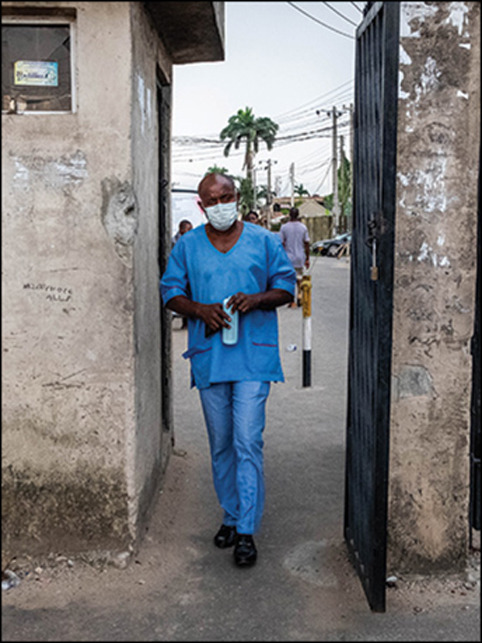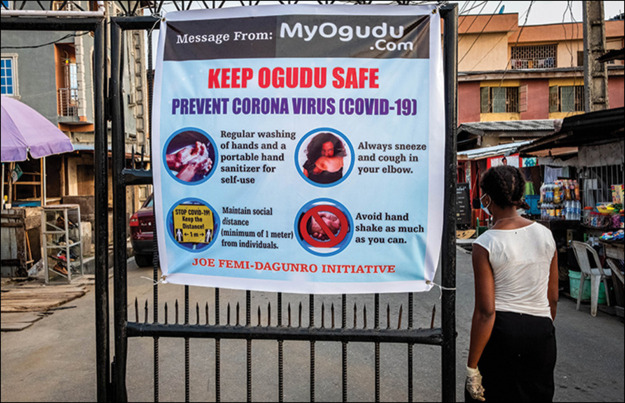With a population of over 200 million people, Nigeria is one of the most populous black nations worldwide. As with the rest of the world, Nigeria is currently dealing with the coronavirus disease 2019 (COVID-19) pandemic, but in a somewhat different fashion.
On Feb 27, 2020, the first official case of COVID-19 in Nigeria was announced. The patient was an Italian citizen, who had recently arrived in Lagos from Europe and who, a few days later, tested positive for the disease. In Ogun state, a neighboring state to Lagos, another patient was identified and was discovered to have been in contact with the first patient. Since then, the situation has developed with more cases occurring, regardless of measures initiated by the state and federal government to combat the virus and return to normalcy. As of April 22, there were 873 confirmed cases, 197 recoveries, and 28 deaths.
WHO has advised on several methods to help prevent spread of the virus and to save health systems across the world from a complete collapse—eg, health washing, social distancing, and staying at home. However, Nigeria's health system before the pandemic was nearly non-existent. In most of the cities', health systems are completely dilapidated as they have not received adequate attention, and some government officials have contributed to health system collapse by encouraging medical tourism.
The federal government of Nigeria enforced an initial 2-week lockdown on March 30, 2020, for three of 36 states (Lagos, Ogun, and Abuja) and, on April 13, extended it another 2 weeks. Shortly after the order was announced by the President, Muhammadu Buhari, there was an uproar among the citizens due to a myriad of concerns. Nigeria, in 2018, was announced by the World Poverty Clock to be the poverty capital of the world, with over 40% of its citizens living below the poverty line. Therefore, a large proportion of the population, especially in the commercial hub of Lagos, live on daily income with no savings to act as a financial buffer during the lockdown. The prospect of staying at home could, therefore, lead to another problem: hunger. Several people, such as Osas, a young plumber who lives and works in the city, have commented on social media about how, despite being fully informed about COVID-19, they still cannot relate to it as much as the hunger being experienced across the country.
© 2020 Bernard Kalu
Buhari promised the citizens some palliative measures, which include disbursing of funds and food items to those most affected. But the reality on the ground is a far cry from the promises made; only a small proportion of the population attest to receiving any support. A large number of citizens have disobeyed the lockdown order in the hope of making sales or trying to earn money through other services, but they were apprehended by the police. The combined effort of the police and the military to enforce the lockdown may have caused more deaths than the infection itself.
As well as the other negative outcomes attributed to the lockdown, Lagos has seen a huge spike in armed robberies.
One has to question whether these aforementioned negative effects override the reasons for the lockdown in the first place: to flatten the curve of infections. According to news from other countries in Africa, the situation in Lagos is almost a perfect mirror of the situation across the whole continent, with the exception of a few countries (eg, Rwanda), where governments have been able to enact effective solutions to the pandemic and provide palliative measures.
There are some positives to consider; the private sector, churches, and non-governmental organisations have provided a lot of support to communities across Lagos and the rest of Nigeria. They have facilitated countless distributions of food items to some of the most deprived areas of Lagos. Also, there is hope that the health sector will finally receive the attention it needs from the government in response to the lessons learned from this pandemic. Despite the socioecomonic differences seen across Nigerian communities, there has been a sense of togetherness during this time.
© 2020 Bernard Kalu
Irrespective of these positive aspects of COVID-19 and of lockdown, fears remain that the number of deaths as a result of lockdown measures will be greater than those due to infection. The Nigerian government must aim to protect its citizens and provide them with the necessary commodities or funds to help mitigate the consequences of this pandemic.

© 2020 Bernard Kalu
Bernard Kalu is a documentary photographer based in Lagos, Nigeria; his work aims to explore life and humanity, with special focus on raising awareness about environmental and social issues in his home country, Nigeria. You can find more of his work on www.bernardkalu.com




